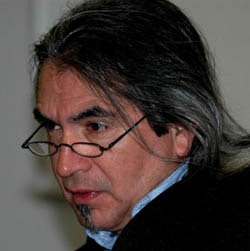Dr. Daniel Wildcat
Power and place: Dr. Wildcat on Rights of Mother Earth
By Brenda Norrell
Censored News
Watch video below
HASKELL INDIAN NATIONS UNIVERSITY, Kansas – Dr. Daniel Wildcat encouraged a new dialogue, based on spirit, power and place, and a renewal of the ancestral ways of life, during the Rights of Mother Earth Gathering.
“Our power resides in the landscapes and seascapes that we call home," Wildcat said at the gathering which continues the efforts of Bolivian President Evo Morales and the World Peoples Conference on the Rights of Mother Earth and Climate Change held in Cochabamba, Bolivia, in 2010.
Dr. Wildcat, Ph.D., Yuchi member of the Muscogee Nation of Oklahoma and professor at Haskell Indian Nations University, was a featured speaker and organizer of the Rights of Mother Earth Gathering, April 4 -- 6.
Wildcat shared the importance of speaking from a power of place, a power of spirit.
Quoting Henrietta Mann, Northern Cheyenne, when she was a visiting teacher at Haskell, Wildcat said the struggle is to be competent beings.
“We are born spiritual beings, we know that. What are we struggling with? We are struggling to be competent beings.”
“We speak from the heart. We speak from the spirit.”
Wildcat remembered the words of Vine Deloria, Jr., about power and place and how this produces personality.
“Let’s play to our strength. What is our strength? Our spiritual center of who we are as Indigenous Peoples," Wildcat said.
“Our power resides in the landscapes and seascapes that we call home.”
Pointing out the power of place of the White Mountain Apache and Dine,' Wildcat said, “Wisdom sits in places, let’s grab that.”
Wildcat also described the dichotomy between nature and culture. “Everyone in this room has spoken in their own way.” He said this is the beauty of the unique tribal identities as expressions of homelands and what has been given. The Creator gave stories of emergence, songs and ceremonies.
“Our cultures reflected that.”
While discussing the Rights of Mother Earth, he said that cultural diversity must be acknowledged along with biological and ecological diversities. This is what gives Native people their identities. Others must acknowledge the cultural diversity that has given Native people their unique tribal and cultural identities.
Today's movement is the renewal of old ways and practical knowledge in the world we live in today, without wanting to go back in time. He urged moving away from linear thinking that looks at life in terms of past and future time lines.
The focus should be on moral and spiritual ecology, which includes human communities -- human communities within ecosystems. He pointed out that in the northwest, coastal people learn by being out on the water, out on the river.
It is important to acknowledge that we are one small part of it all. However, humans look in the mirror and think they are building something called progress and destruction.
Urging everyone to become part of this renewal, he said, “There’s work for everyone here.”
Native people will not walk away from inalienable responsibilities. Although others are after Native peoples water, land and forests, he said it is important to discover a new discourse.
Quoting Oren Lyons, Wildcat said, “Be careful about the words you use. We don’t have a word for resources.” When Native people refer to the land, trees and human life around us, they speak of relatives and relationships.
The ongoing discourse, he said, is about living well and respectively with relatives in relationships. “We move from rights to responsibilities; we move from resources to relatives.”
“We want to talk about resilience of new systems, restoration of indigenous systems, where people understand we are one small part of this complex web of life.”
This is Indigenous realism, not romanticism, he said.
Referring to formal education, he said this is only one way of knowing. There is also experiential learning. “We don’t have to learn through controlled experience.”
“We are in the belly of the beast. It doesn’t mean that we don’t have the opportunity to make change.”
Wildcat pointed out that the Haskell Indian boarding school here once had a jail that incarcerated children for speaking their language.
"Look at where we are now. Let's roll up our sleeves and get to work."
Listen below to Dr. Wildcat’s talk at the Rights of Mother Earth Gathering:
Recorded by the Indigenous Environmental Network and Earthcycles.
For permission to republish this article in full: brendanorrell@gmail.com
Feel free to share the link.
Article copyright Censored News.

0 nhận xét:
Đăng nhận xét